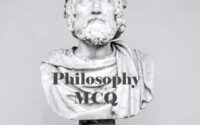Philosophy Important Questions Papers
On this page, Applicants can check the below links for downloading the Philosophy Important Questions Papers. The Philosophy Important Questions Papers will be helpful for the applicants in their preparation.

Hence, the people can begin the practice by downloading Philosophy Important Questions Papers. The Philosophy Important Questions Papers may not contain the originally asked questions. Free downloading links of the Philosophy Important Questions Papers are enclosed below.
Important Questions on Philosophy
1. Ramanuja defines kala as…………..
(A) Sattvasunya
(B) Shuddha sattva
(C) Misrasattva
(D) Sattva Pradhana
2. ……..has refuted Mayavada on seven, grounds.
(A) Samkaracarya
(B) Ramanujacarya
(C) Madhvacarya
(D) Vallabhacarya
3. Which of the following is acceptable to Purva -mimamsa school?
(A) The universe is without beginning and end
(B) The universe is without beginning but has an end.
(C) The universe has beginning and it is unending
(D) The universe is created by God
4. Who has advocated Vyapti (invariable concomitance) as an important part of Anuman (inference).
(A) Naiyayika
(B) Samkhya
(C) Carvaka
(D) Sankara
5. According to Madhva:
(A) God is the author of the Vedas
(B) God is the compiler of the Vedas
(C) God is the great teacher of the Vedas
(D) Vedas have nothing to do with God
6. Who advocated the notion of open air classroom?
(A) Tagore
(B) Iqbal
(C) Gandhi
(D) Dr. Radhakrishnan
7. According to Radhakrishnan the general principles of life and logic and the basic assumptions of sciences are known through ……..
(A) Intuition
(B) Intellect
(C) Perception
(D) Inference
8. According to Ambedkar, Marxist challenge is met by:
(A) Vedanta
(B) Buddha
(C) Carvaka
(D) Kabir
9. In the process of education Tagore gives importance to ………..
(A) Technological efficiency
(B) Theoretical knowledge
(C) Free minds
(D) Scientific knowledge
10. Which of the following is not intended by Sri Aurobindo?
Evolutionary growth is:
(A) Widening
(B) Heightening
(C) Multiplying
(D) Integrating
11. Which of the following statements is not acceptable to K.C. Bhattacharya?
(A) Philosophy is self-evident elaboration of the self-evident.
(B) Philosophy is systematic symbolism
(C) Philosophy is informative
(D) Philosophy is both (A) and (B)
12. Which of the following ideas is not stated by J. Krishnamurti?
(A) All relationships are image based
(B) Ideals are essential for human life
(C) We live in fragments
(D) What you see in totality is truth
13. Who propounds that ascent without descent is unthinkable?
(A) Tagore
(B) Iqbal
(C) Radhakrishnan
(D) Aurobindo
14. Maya, according to Vivekananda, is:
(A) Power of creation
(B) Power of illusion
(C) Attachment
(D) Fact of contradiction
15. Which of the following is maintained by Gandhiji?
(A) Truth is the means and non-violence is the end.
(B) Truth is the end and non-violence is the means
(C) Truth and non-violence are intelligible and hence practical
(D) Truth and non-violence are unintelligible but practical
16. According to Vivekananda Universal religion is for:
(A) All human beings
(B) All religious people
(C) All Hindus
(D) All Indians
17. According to the sophists ethical principles are:
(A) Relative
(B) Universal
(C) Objective
(D) Given by God
18. Things are numbers according to:
(A) Atomists
(B) lonians (philosophers)
(C) Sophists
(D) Pythagoreans
19. Socrates rejects the view that:
(A) Virtue is knowledge
(B) Virtue is one
(C) Virtue is teachable
(D) Virtue is unattainable
20. Plato’s world of forms is:
(A) in space and time
(B) beyond space and time
(C) in the mind of God
(D) in the Soul
More Question Papers on Philosophy
| Question Papers | Question Bank |
| MCQ Objective | Practice Set |
| Selected Question | Mock Test |
| Typical Question | Old Questions |
| Test Papers | Sample Papers |
| Important Question | Model Question |
21. Plato believes that knowledge is not:
(A) Perception
(B) True opinion
(C) Belief
(D) All the above
22. According to Aristotle, logic is:
(A) A practical science
(B) A theoretical science
(C) An organon
(D) A productive science
23. Aristotle classifies soul into:
(A) Four types
(B) Three types
(C) Two types
(D) Five types
24. Aristotle’s theory of universals is:
(A) Nominalism
(B) Conceptualism
(C) Realism
(D) Transcendentalism
25. Which of the following statements is associated with St. Thomas Aquinas?
(A) There is nothing in the intellect unless it is first in the senses.
(B) Believe, so that you may understand.
(C) You cannot step twice in the same river.
(D) Life unexamined is not worth living.
26. St. Thomas Aquinas tried to synthesize the philosophies of:
(A) Plato and Christianity
(B) Aristotle and Christianity
(C) Aristotle and St. Augustine
(D) Plato and St. Augustine
27. According to Descartes, the most fundamental character of matter is that it is:
(A) Coloured
(B) Extended
(C) Movable
(D) Stationary
28. According to Descartes, the idea of God is:
(A) A possibility
(B) A belief
(C) An innate idea
(D) An inference
29. According to Leibnitz, the source of ‘Pre-established harmony’ is:
(A) Mind
(B) Human world
(C) Religious text
(D) God
30. Berkeley’s dictum ‘Esse Est Percipi’ means:
(A) Whatever exists, is independent of mind
(B) Whatever exists, is dependent on mind
(C) Whatever exists, is caused by thought
(D) Whatever exists, is dependent on God
31. The view that all existence has its root only in the idea, is upheld by:
(A) Descartes
(B) Spinoza
(C) Hegel
(D) Locke
32. According to Hume, all materials of our thinking are derived from:
(A) Outward impressions only
(B) Inward impressions only
(C) (A) and (B) both
(D) Reason
33. According to Kant, “Propositions of natural sciences’ are:
(A) Analytic a priori
(B) Synthetic a priori
(C) Synthetic a posteriori
(D) Analytic a posteriori
34. Hegel claims that root of all life and movement is governed by:
(A) Principle of necessity
(B) Principle of probability
(C) Principle of contradiction
(D) Principle of negation
35. For Neitzsche, will to power is:
(A) Political will
(B) An empirical fact
(C) A primordial drive
(D) A rational faculty
36. In Nietzsche’s’ philosophy, Dionysian force is associated with:
(A) Rational aspect of human nature
(B) Passionate aspect of human nature
(C) Physical aspect of human nature
(D) Order in the world
37. According to Ayer, meaning of a synthetic statement is determined by:
(A) Intuition
(B) Introspection
(C) Empirical verification
(D) Inference
38. Peirce did not advocate:
(A) Fallibilism
(B) Foundationalism
(C) Pragmatism
(D) Real doubt
39. According to the Pre-Upanisadic view found in the Vedic hymns, the Rta order is maintained by :
(A) Devas
(B) Asuras
(C) Human beings
(D) The laws of nature
40. According to Leibnitz, the following is not a characteristic of Monads :
(A) Perceptive
(B) Windowless
(C) Dependent upon other monads
(D) Independent of other monads
41. Nietzsche’s view that our beliefs about the world are conditioned by our spatio-temporal framework is called :
(A) Physicalism
(B) Phenomenalism
(C) Psychologism
(D) Perspectivism
42. Carvaka rejects the existence of ether because ……………………….. .
(A) It is vibhu
(B) It is not perceived but inferred
(C) It does not have a separate existence
(D) It is only void
43. Hegel’s dialectic :
(A) begins with the ‘Absolute Idea’
(B) continues with the ‘Absolute Idea’
(C) terminates with the ‘Absolute Idea’
(D) fractures the ‘Absolute Idea’
44. According to Nyayadarsana, the following is not an independent source of knowledge :
(A) Anumana
(B) Anupalabdhi
(C) Pratyaksa
(D) Sabda
45. Aristotle’s explanation of nature is :
(A) Mechanical
(B) Social
(C) Teleological
(D) aesthetic
46. According to Hume knowledge is restricted to :
(A) Only impressions
(B) Only ideas
(C) Impressions and ideas
(D) Platonic ideas
47. According to Upanisadic view :
(A) Sreyas is equivalent to Preyas
(B) Sreyas is superior to Preyas
(C) Preyas is superior to Sreyas
(D) Preyas and Sreyas are superior to Nihsreyasa
48. According to Gandhi, Ahimsa and Truth are like the two sides of a coin, because :
(A) Truth is the means and Ahimsa is the end
(B) Both are identical
(C) Ahimsa is the means and Truth is the end
(D) They are two independent principles
49. According to early Wittgenstein, the world is a totality of ………………. .
(A) Simples
(B) Facts
(C) Things
(D) Relations
50. Which one of the following is not a work of Kant ?
(A) Critique of pure reason
(B) Critique of practical reason
(C) Critique of judgement
(D) Critique of human reason

